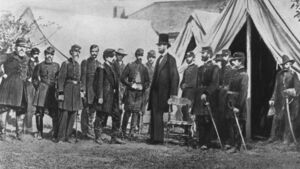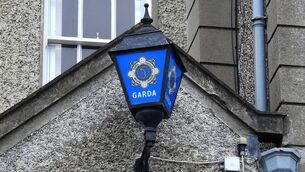A tale of two Mayo men in the American Civil War

President Abraham Lincoln visiting soldiers encamped at the Civil War battlefield of Antietam in Maryland in 1962 It was one of the bloodiest in the whole American Civil War. Picture: Rischgitz/Getty Images
About a 30-minute drive south of Philadelphia, five miles west of the Delaware River, lies the community of Sewell. Located in the township of Mantua Township, Sewell is a quaint town, a stop-off just off the beaten track between Philadelphia and Atlantic City with a population just short of 3,500 people. It's a typical American town - full of the usual people and businesses and not exactly swollen with tourists.
The place was named after a man by the name of William Joyce Sewell, a decorated American Civil War veteran who went on to have a distinguished career as a politician during the latter half of the 19th century. His post-war career in politics even brought him all the way to the Capitol in Washington DC where he served as a US senator for the state of New Jersey.
Sewell was born in Castlebar in 1835, emigrating to Chicago with his family as a teenager just as Ireland grappled with the Great Famine. A few years after he sailed across the Atlantic to a better life, he moved further south and settled in New Jersey where he would ultimately spend most of his life. By then though, tensions were beginning to become fraught across the United States due to some very diverging opinions on slavery. The North and the South, as has been well documented in the history books, had very different views on the subject of race. And those tensions escalated upon the election of Abraham Lincoln to the office of president. President Lincoln's staunch opposition to slavery across the country led southern states to form the Confederacy in February 1861. Two months later, and only a year after the election of President Lincoln, the American Civil War broke out.
Sewell hadn't been living in Camden, New Jersey for long when he decided to join the Union Army. And despite not having a decorated military career, he was immediately made captain. But while he may not have had much experience in combat, the Irish-American quickly settled into the role and cultivated a reputation as a very capable leader among his peers. He first rose to prominence at the Battle of Chancellorsville where he led a number of prominent offensives, capturing over 1,000 Confederacy prisoners in the process. While the Union Army was eventually outwitted by some astute decision-making on the battlefield by General Robert E Lee, who split his army in two to take on an army twice the size, Sewell was able to retreat with his reputation still intact. He was also wounded in the battle and would later be awarded the Medal of Honor, the highest military decoration in the United States, for his efforts to the Union cause.
Despite his injuries, Sewell returned to the battlefield in time for the Battle of Gettysburg less than two months later and was likely present when President Lincoln gave his historic 272-word Gettysburg Address speech ahead of a Union victory against General Lee's forces. Once again, Sewell refused to shy away from combat and was wounded in battle. He was eventually stood down as the Union Army inflicted revenge on their southern counterparts who were beginning to make headway into their territory. Sewell didn't fight in battle again. But by the time he stepped away from combat, he had already cultivated such an esteemed reputation that he would eventually be promoted to Brigadier General.
When he was finally awarded his Medal of Honor in 1896, his citation read: "Assuming command of a brigade, he rallied around his colors [sic] a mass of men from other regiments and fought these troops with great brilliancy through several hours of desperate conflict, remaining in command though wounded and inspiring them by his presence and the gallantry of his personal example."
That reputation stood with him throughout his life as he became a hugely admired member of the community in New Jersey. His post-war career began in the railroad business, where he rose to hold powerful roles within a number of companies in the industry. Those roles set the foundations for a political career that began in his home state and eventually ended in Washington DC. He was first elected to the New Jersey State Senate in 1872. And after serving as it's president from 1876 to 1880, he was elected to the United States Senate in 1881. He failed in his attempt to be re-elected in 1886 though, perhaps not too dissimilar to his actions on the battlefield, he persisted with politics and once again became a US senator in 1895. He continued to serve in this role up until his death in late December 1901.
However, Sewell wasn't the only man with strong Mayo roots who was involved in the American Civil War.
Little is known about William Montague Browne's early life in Mayo, but he is believed to have travelled to the United States in 1852 where he became editor of the , a title which is still in existence today. He remained in that role for the best part of a decade before moving to Washington DC where he continued to ply his trade in journalism, becoming editor of the . But Browne was a man who wore more than one hat.
He became a close friend of President James Buchanan during his time in the city, also becoming known as one of his closest and trusted advisors. President Buchanan was quite conservative despite coming from the North and thereby believed in preserving the rights of individual states to legislate as they saw fit. While he is understood to have personally opposed the concept of slavery, he believed states had the right to decide whether or not slavery was abolished. Needless to say, he went to great lengths to appease slaveholders from the southern states.
Those sympathies were shared by Browne, who regularly argued the case of the southern cause in the Washington Constitution. As American society became fractured towards the tail-end of the 1850s and into the 1860s, Browne became more and more involved with those who argued fervently for the preservation of slavery. By the time the Confederacy was formed in 1861, Browne was rubbing shoulders with some of the leading names on that side of the divide. He no longer simply had the ears of those in the corridors of power - he was becoming a permanent figure in them.
As war broke out, Browne eventually ascended to the rank of Brigadier General of the Confederate Army. On his way to that position, he served as the Confederacy's acting Secretary of State for a period of 11 days in 1862, as well as being aide-de-camp for President Jefferson Davis. He was never too far away from crucial decision-making as the Confederacy planned their next move against the Union.
But despite some incursions into Union territory, the Union eventually emerged victorious and the Confederacy disbanded in 1866.
Following the war, Browne returned to civilian life, as was the case with many other prominent veterans. And life appeared to be heading along a prosperous path for the Mayo native. Although he was admitted to the bar in Georgia, he ultimately returned to journalism and began editing the Southern Banner, which had been a strong advocate for secession before and during the war. Such was his versatility, Browne then became a Professor of History and Political Science at the University of Georgia.
Yet despite clearly being a man of great intellect and numerous talents, he died in relative poverty.
His situation was illustrated in a letter he wrote to Varina Davis, the wife of the Confederacy president who was imprisoned following the war. With her husband incarcerated, Browne had reached out to offer comfort, while also admitting that he hadn't the funds to come visit her in person as he had hoped.
"Locomotion is impossible," he wrote. "My poverty and not my will keep me at once from going to see you."
He added: "My house and a few acres of poor land are all I have left. You know how, contrary to the advice of wise friends, I gave all I had to the govt [sic]. I never tried to get it back, but lost all when all was lost."
Sewell, on the other hand, experienced a vastly different life following his efforts in the war.
When he died in late 1901, he was declared an American hero in his hometown of Camden. According to a report on the front page of the , his funeral was an "imposing affair" with members of the military and US Congress, along with the governor, governor-elect and other public officials all attending to pay their respects to the deceased. Business in Camden was also suspended as a mark of respect to the veteran.
While one Mayo man faded into history, the legacy of the other continues to be felt today with a New Jersey town named in his honour.
Winston Churchill was searingly accurate - history is indeed written by the victors.





